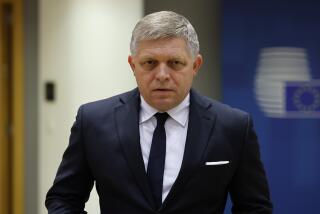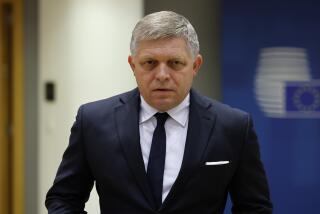Colorful Slovak Leader Sees Red Over Media Criticism
BRATISLAVA, Slovakia — Markiza Television made a big splash in December with a report that Slovak President Rudolf Schuster was briefly kidnapped last summer during a family vacation in Brazil by Indians demanding ransom.
“We were held captive,” Schuster told a reporter for the private Slovak network. “We did not know why and for what. While this was happening, the Indian who had invited us and the chief who had imprisoned us started up a quarrel, and I thought they would even begin to fight each other.”
His captors, armed with spears and bows and arrows, were demanding a Mercedes-Benz and some cows, added the president, who before going to Brazil had told reporters that he wanted to see big snakes and exotic animals.
Although Markiza Television played Schuster’s statements as serious news, leading Slovak newspaper Pravda reported that the incident was simply “a spectacle for tourists.” Schuster has said nothing since to clarify his adventure.
Although many politicians in Eastern Europe are, like Schuster, former Communists, few have his flamboyant touch.
Proving that a onetime apparatchik doesn’t have to be colorless has served Schuster well politically. But critics charge that beneath his outgoing personality are old attitudes harmful to this fledgling democracy--in particular, a lack of respect for a free press.
Schuster’s flair goes back at least to his days as mayor of the eastern Slovak city of Kosice in the mid-1990s, where he organized dance festivals in the streets and the collective baking of a record-size cake. He also drew attention by decorating the outside of his house with Christmas lights, common enough in the U.S. but unusual in Slovakia.
But critics say Schuster showed his true colors last year when he pressed criminal libel charges against Ales Kratky, a commentator for the Novy Cas daily.
Kratky had ridiculed Schuster’s annual state of the nation speech as self-centered. He called it a “state of the soul” address from “a puffed-up egomaniac who last experienced real life during his early childhood and who now smiles at thunderstorms under the illusion he is being photographed.”
Schuster’s effort to see Kratky imprisoned for up to two years under a law forbidding vilification of the government or its leaders triggered a parliamentary effort to repeal the Communist-era statute that fell a vote short. But last month, the Constitutional Court suspended the law on the grounds that it “could threaten freedom of expression.”
“Slovak politicians, whether in the government or in the opposition, are not prepared for criticism,” an unrepentant Kratky said in an interview after the ruling. “They want to have more than standard protection.”
One of the Slovak president’s few powers is to nominate the prime minister, a post that generally goes to the head of the party finishing first in parliamentary elections. But the president has some freedom of choice, and polls suggest that the current ruling coalition and the two major opposition parties may all fall short of a majority in September elections.
Schuster’s rise followed a very different path from his more famous counterpart, Vaclav Havel, who leaped from being an anti-Communist dissident playwright to the presidency of Czechoslovakia and then of the Czech Republic. Czechoslovakia split into the Czech Republic and Slovakia in 1993.
A technical university graduate, Schuster built his career as a Communist Party official at a huge steel mill in Kosice. He served as Kosice’s mayor from 1983 to 1986. After the 1989 collapse of communism in Czechoslovakia, Havel appointed him ambassador to Canada.
Schuster helped attract significant Canadian investment to Czechoslovakia. But a 1991 law banned former Communist officials from holding public office, and Havel was forced to recall him in 1992. After the country’s breakup, the law did not apply in Slovakia and Schuster returned to the political arena.
He was elected mayor of Kosice in 1994 and reelected in 1998. By that time he was a popular figure on the national scene, partly because his city’s downtown core had undergone extensive restoration.
After Schuster became president, however, it became widely known that the city had borrowed heavily to finance the upgrade. Today, opinions vary sharply over whether Schuster benefited the city--which faces debts of $38 million--or only himself.
“I assess the work of Mayor Schuster from 1994 to 1999 very positively,” said Zdenko Trebula, Kosice’s current mayor. “If you came to our city before 1994, you would have seen that it was in rather poor condition, and he really improved it. The city gained a completely different image.”
Trebula added that “the debt is manageable.”
Jan Suli, the head of Kosice’s Old Town district, was far more critical.
“When he started to work in the city, everybody was jubilant that finally something was moving forward,” Suli said. “Then he left in 1999 for the presidency, Kosice woke up, and we had to pay for it. . . . I think that Mr. Schuster did it consciously. He wanted to be president, and he used it as an electoral campaign.”
Younger Slovaks are more likely than their elders to see Schuster as a relic of communism.
“I think we need a new president, a fresh man who wouldn’t have the past that our current president has,” said Gabriel Ganz, 31, a disco club owner in Kosice.
Schuster doesn’t greatly dispute the idea that it’s just about time for former Communists to retire.
“We need a young generation who are better prepared than I am, who weren’t involved in the old regime and will look ahead,” he recently told the Prague Post. “I think this time is very close.”
But Schuster still has plenty of fans. Robert Fico, a populist politician and a candidate to be the next prime minister, praised Schuster as “a very experienced man” who “knows the practical life.”
“He understands Slovakia,” Fico said.
More to Read
Sign up for Essential California
The most important California stories and recommendations in your inbox every morning.
You may occasionally receive promotional content from the Los Angeles Times.










